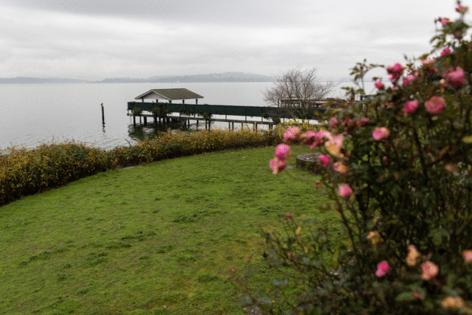Nearby residents sue Seattle over management of nude public beach
Published in News & Features
SEATTLE — A group of residents from the Denny Blaine neighborhood is suing Seattle over its management of Denny Blaine Park, a 2-acre plot on Lake Washington that the lawsuit argues has been home to frequent public masturbation and indecent exposure.
The lawsuit, filed Wednesday, is the latest step in a multiyear fight over the park and its uses. For decades it has garnered a reputation as a nude beach and cherished gathering place for many in the city’s LGBTQ+ community.
Lee Keller, spokesperson for the plaintiffs, said their complaint is not with the city’s LGBTQ+ community, but instead the city not asserting control over the “public nuisance” issues.
“This has absolutely nothing to do with somebody’s sexual preference,” she said. “It has everything to do with breaking the law.”
The specific allegations of the lawsuit relate to what the residents say is repeated and “lewd” public masturbation in the park, in addition to illegal drug use and indecent exposure.
Lawyers for the plaintiffs collected “hundreds” of examples to support their case since July 2021, the lawsuit says. Some are anecdotes from neighbors, others are official police reports and court records.
In one week in March, for example, the lawsuit pointed to four different documented examples of people masturbating in the park. The lawsuit also includes video of someone masturbating in the park.
Denny Blaine residents, who are not named in the lawsuit, have pushed for changes for years. In May 2022, a person reached out directly to Mayor Bruce Harrell as part of an effort to pay for changes to the park, including building a playground there. Keller declined to name the person, though news outlets have reported it to be Stuart Sloan, who owns the University Village shopping center.
News of the private lobbying flared tempers among those who hold the park dear. Since at least the mid-1980s, it has been used as a nude beach, with a particular importance for LGBTQ+ people. Sloan’s reported lobbying gave the impression to some that moneyed interests were more important to City Hall than the community that uses the park, an allegation the mayor’s office denied.
The city backed off its plan for the playground last summer. Sophie Amity Debs, an organizer with the Save Denny Blaine campaign, described Wednesday’s lawsuit as the latest in a series of attempts by some neighbors to shut down nudity at the park altogether. She said her group is also concerned about public masturbation, but the lawsuit also includes complaints about nudity more generally, she pointed out. In Washington, it’s a crime to get naked in public only when a person knows it’s likely to cause “affront or alarm.”
Although the lawsuit accuses the city of failing to care for the park, such claims seem “kind of baseless,” Debs said. In reality, she said, the city has been “bending over backwards” for years “to accommodate the neighbors” by reducing parking at the park, planning capital improvements and sending police there on a regular basis.
The Save Denny Blaine group participated in meetings last year with city officials and neighbors to try to find common ground and agree on strategies and rules that could help keep the park safe, such as trash abatement and signs warning against bad behavior, Debs said.
“Us and the neighbors are aligned that folks masturbating and performing sexual acts at the beach and making others uncomfortable is not something we want to have happening,” she said.
The meetings ultimately broke down, Debs said, because of disagreements over nudity.
Keller acknowledged the residents suing the city have joined in meetings to discuss the park, but have grown frustrated by what they view as a lack of follow-up.
“They really were waiting for action from the city and it just has not happened,” said Keller.
The work that has been proposed so far — which includes improvements to stairs — is not focused on eliminating illegal behavior but instead on “improvements that will make the park more welcoming and thus increase pervasive violations” of the city’s code, residents wrote in the lawsuit.
City Councilmember Joy Hollingsworth, who chairs the committee overseeing parks, said earlier this year that she wants to strike a balance of preserving the park’s character while also eliminating public safety hazards.
“There are some public safety issues that are going down there that I don’t want the whole entire user group to get looped in with,” she said in a January interview.
Debs said the park has a decadeslong history of overlapping use as a nude beach and as a queer-friendly space.
“It’s important for a lot of folks, especially folks who have been made to feel uncomfortable in their bodies,” she said. “There’s not a lot of places where they can go to feel safe and secure in their bodies and be open at the beach.”
A spokesperson for Harrell, Jamie Housen, said the mayor has deployed park rangers and police enforcement to the park while also adding more restrooms and litter pickup.
“The mayor has consistently stated that while individuals have a right to be nude at parks under state law,” Housen said, “no one has the right to commit lewd, illegal, and unwanted sexual conduct at our parks, and no one has the right to make others feel unsafe at the park.”
The lawsuit, filed in King County Superior Court, is asking a judge to order the city to commit more resources to clamp down on the park’s activity. Keller said they prefer the park not to close, but added, “If that’s what has to happen in order for the law to be upheld, then that’s what has to happen.”
©2025 The Seattle Times. Visit seattletimes.com. Distributed by Tribune Content Agency, LLC.







Comments